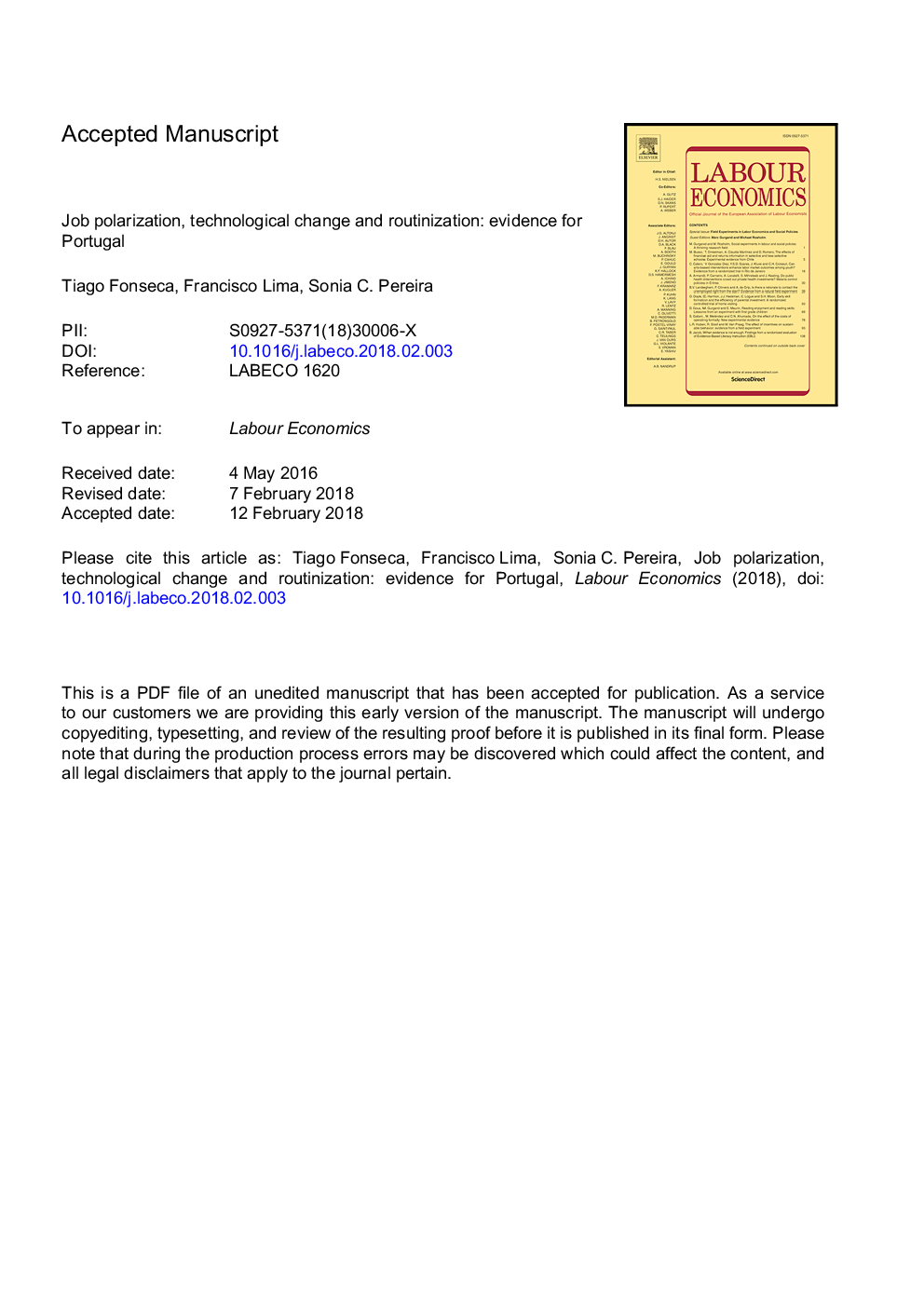| کد مقاله | کد نشریه | سال انتشار | مقاله انگلیسی | نسخه تمام متن |
|---|---|---|---|---|
| 7371313 | 1479686 | 2018 | 54 صفحه PDF | دانلود رایگان |
عنوان انگلیسی مقاله ISI
Job polarization, technological change and routinization: Evidence for Portugal
ترجمه فارسی عنوان
قطبش کار، تغییرات تکنولوژیکی و برنامه ریزی: شواهد برای پرتغال
دانلود مقاله + سفارش ترجمه
دانلود مقاله ISI انگلیسی
رایگان برای ایرانیان
کلمات کلیدی
ترجمه چکیده
این مقاله پولاریس بازار کار را در پرتغال، کشوری با انباشت سرعتی آهسته و سهم کم کارگران با تحصیلات، مورد بررسی قرار داد. ما از دادههای سرشماری سالهای 1986 تا 2007 استفاده می کنیم و در نیمه دوم این دوره، قطبش در اشتغال و دستمزد را کشف می کنیم. به نظر می رسد این به دلیل تغییرات تکنولوژیکی است. نتایج ما نشان می دهد که افزایش شدید هر دو اشتغال و حقوق و دستمزد برای وظایف انتزاعی نسبت به وظایف معمول است. در مقایسه با ادبیات موجود، ما بین وظایف دستی معمولی و وظایف شناختی روان را جدا می کنیم. ما کاهش شدید در اشتغال دستی روان را کشف می کنیم، اما کاهش اشتغال شناختی رو به کاهش است و با افزایش حقوق و دستمزد همراه است که ظاهرا به دلیل انتخاب کارگران نیست. این نتیجه ی دوم عمدتا با گسترش گسترده بخش خدماتی است که کارکنان بسیاری را در شغل های شناخته شده معمولی و احتمال پذیرش سرمایه کمتری که از سطح نسبتا پایین سرمایه انسانی انتظار می رود، توسط استانداردهای بین المللی به کار می گیرد.
موضوعات مرتبط
علوم انسانی و اجتماعی
اقتصاد، اقتصادسنجی و امور مالی
اقتصاد و اقتصادسنجی
چکیده انگلیسی
This paper studies labor market polarization in Portugal, a country with slow capital accumulation and a low share of highly educated workers. We use firm census data for 1986-2007 and uncover polarization in employment and wages in the second half of this period. This mostly appears to be due to technological change. Our results show a sharp increase of both employment and wage premium for abstract tasks relative to routine tasks. In contrast to the existing literature, we separate between routine manual tasks and routine cognitive tasks. We uncover a sharp decline in routine manual employment but the decline in routine cognitive employment is modest and coupled with an increased wage premium that does not appear to be due to worker selection. This latter result is mainly explained by the large expansion of the service sector which employs many workers in routine cognitive-intensive jobs and the likely slower computer capital adoption resulting from the relatively low levels of human capital, by international standards.
ناشر
Database: Elsevier - ScienceDirect (ساینس دایرکت)
Journal: Labour Economics - Volume 51, April 2018, Pages 317-339
Journal: Labour Economics - Volume 51, April 2018, Pages 317-339
نویسندگان
Tiago Fonseca, Francisco Lima, Sonia C. Pereira,
